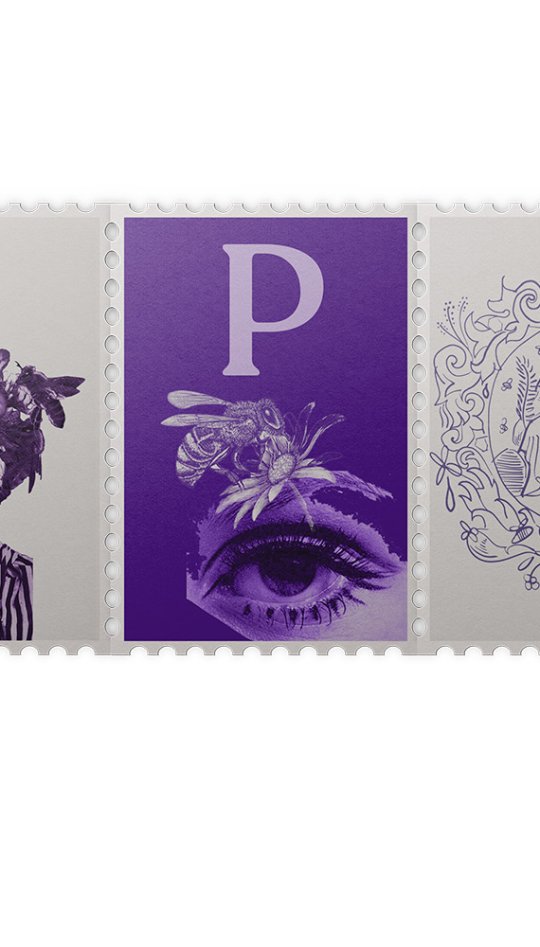
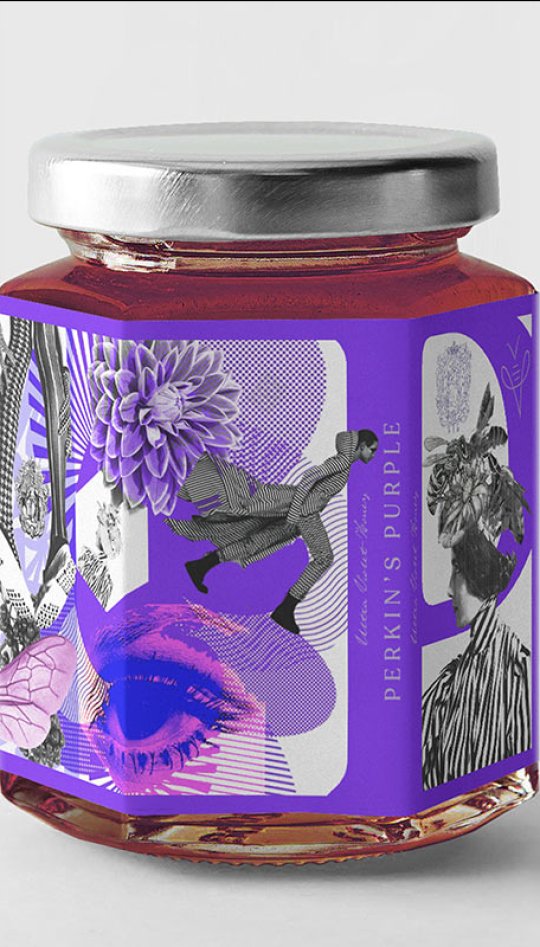
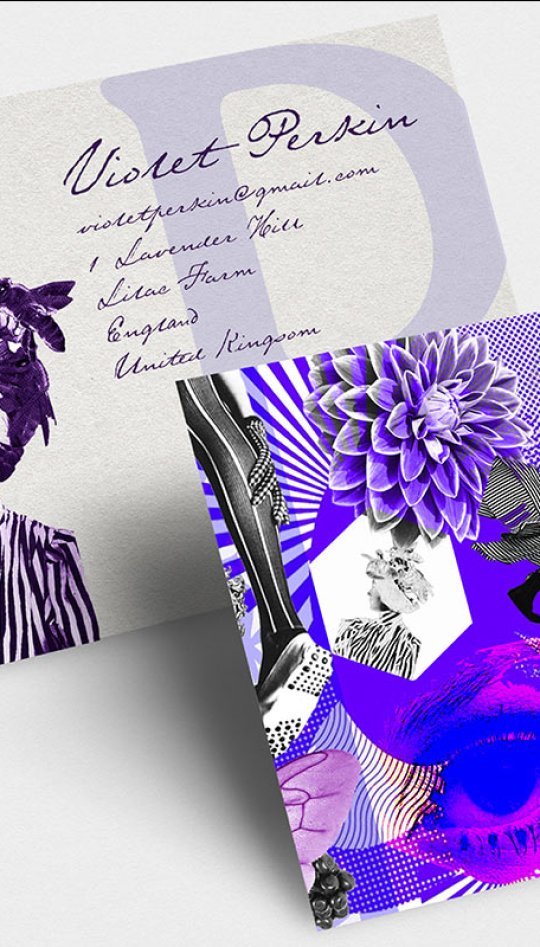
Graphic Design BA(Hons)
Redefine the world around you as an adaptable, articulate, graphic designer.
Course overview
Graphic Design is one of the most versatile visual disciplines, embracing words and pictures, form and structure, time and space. It’s also one of the most powerful; touching everything from the clothes we wear, the political ideas we believe in, and the way we shape the future of our planet. Good design thrives by looking for new ways to tell both familiar and emerging stories; it’s in clever ideas and beautifully executed outcomes, hand-drawn scribbles, and digital masterpieces.
Our Graphic Design degree is evolving alongside the ever-changing design industry and the world around us. Now, more than ever, we are looking for purpose-driven thinkers who can respond to human-centred communication problems, and create genuine, positive outcomes with lasting impact. By studying Graphic Design at Falmouth, you'll gain the expertise to address complex design challenges and emerge as a forward-thinking visual communicator.
Why study this course at Falmouth?
- Be part of a thriving and immersive studio community that embraces innovation, champions risk-taking, and encourages creative collaboration.
- Consider the mechanisms through which graphic design can highlight or disrupt problems in society, directly challenging the nature of the discipline and defining your own set of beliefs.
- Explore and question the process of design, visual language, storytelling, and craft – utilising both traditional and cutting-edge tools and technologies to support your ideas.
- Gain expertise in branding, typography, content creation, UX/UI, and digital media, preparing you for the diverse demands of the design industry.
- Learn in one of the most unique locations in the world, at an independent art-specialist institution, where we nurture a deep connection with people, place, and planet.
- Work on human-centred projects developed by staff, leading industry practitioners, international competition schemes, and through your own enquiry – shaping the outcomes into a career-launching portfolio.
- Participate in key industry events, our optional study trips, and attend guest lectures from industry leaders, ex-students, and our award-winning staff.
- Explore graphic design as a tool for positive change, responding to environmental, ethical, and moral challenges, building together for your future.
Course details
On this Graphic Design degree, you'll have the opportunity to gain a BA(Hons) degree over three years or the option to study Graphic Design BA(Hons) with an Integrated Foundation Year and/or a Professional Placement Year.
With design process and clever thinking at its heart, the Graphic Design degree explores how meaningful, creative ideas can be made. With its formidable connection to industry, award-winning graduates, and integration of theory and practice, you’ll be challenged to think holistically, responsibly, and differently. You’ll look ‘at’ the world around you, rather than be caught up in it.
Our arts pedigree, design-for-change ethos, and the stunning landscape that is Cornwall, shape this unique perspective into a highly desirable quality that is valued by the creative sector world-wide.
From module information, to course aims and assessment criteria, discover the full course details below:
What you'll learn
During your first year, you’ll be encouraged to explore, experiment and question new creative processes and practices, through both thinking and making. This will deepen your understanding of the breadth of graphic design and will begin to shape the future of your unique creative journey. While studying Graphic Design BA(Hons), you’ll be part of a supportive and innovative studio culture, where together you’ll learn to grow your skills, develop multiple ideas, and embrace creative risk.
A variety of briefs, workshops, lectures, and presentations will introduce you to design process, visual language, collaboration, and storytelling.
Modules
Design is?
On this module, you will develop a hands-on understanding of what graphic design is, considering in some detail the creative processes and idea-generation techniques that help define the subject. Through playful, experimental, and disruptive ways of working, you'll broaden a sense of how key principles, habits and an awareness of your own practice can shape and define a viable design outcome.
Design from
The way we learn about graphic design is informed by a rich history of practical and critical discussion. This, in turn, shapes our understanding of how contemporary visual messages can be formed and read. This module provides the opportunity to experiment with (and to challenge if necessary) the building blocks of design language, so you can craft clear messages in response to a variety of current communication challenges.
Design beyond
Here, you’ll practically consider the relationship between design, storytelling and ‘purpose’ when delivering a message. Utilising a variety of media; from human (analogue) through to non-human (AI), and enhanced ways of developing idea generation, you’ll begin to take more ownership of the future direction of the subject (and your degree).
Design with
This module is the backbone of the course, where you’ll be part of live and/or research-led studio projects, working collaboratively with staff, fellow students (from years 2 & 3), and designers from the wider creative community. Projects will invite you to respond to questions and solutions that can positively impact society and our natural environment. The ambition here is to move your thinking beyond the immediate, and to begin functioning at the forefront of the discipline.
In your second year, practical, hands-on thinking is re-considered in the light of historical, theoretical, and critical points-of-view. You will consider the process, craft (including the role of evolving technologies), and context of graphic design in much greater depth. You’ll also explore the role of designer as translator, disruptor, collaborator and facilitator.
Briefs, workshops, lectures, and presentations are complimented by in-depth learning about experience design, brands and consumer culture, typography and information hierarchy, the ethics and responsibility of design practice, design for society and teamwork.
In exploring these themes, you’ll also be encouraged to consider opposing perspectives to the accepted norms, and to wrestle with the tension these areas of design can create.
Modules
Design for
Here, you’ll consider how graphic design has been used for facilitating a conversation between message and audience in the delivery of an idea. Experimenting with visual hierarchy, typography, and content creation, together with a broad range of media, branding, and environmental applications, you’ll consider the role design can play in shaping the effective delivery of a point-of-view or strategic goal.
Design against
On this module, you’ll explore a designer’s place as a radical instigator, activist, and disruptor. There is an urgent need for us to question our actions, become catalysts for change and to consider more fully our responses to the world’s current urgencies (ecology, degrowth, the rich/poor divide, and so on). Historical examples and future scenarios are considered to help develop more radical approaches to behaviour-change in the face of global crisis and how creativity can offer powerful, resilient, and impactful solutions.
Design towards
Here, you’ll be introduced to the role of designer as an agent of positive social change – asking the question, ‘How do I use my skills to build a better world?’. This module marks a central shift in the focus of the Graphic Design degree, where you become both the writer and designer of your own self-authored projects. This will enable you to engage with a range of user-centered communication challenges and the research methods to support social innovation across a variety of sectors.
Design with
This module creates a more clearly defined platform for research-led studio projects, where you’ll again work collaboratively with students across year groups (years 1 & 3), with staff, and with external partners. Projects respond adaptively to challenges impacting society and the environment – ensuring each opportunity is at the forefront of the discipline. Briefs are often undertaken in partnership with business, NGOs and/or researchers to inform the scope and the potential of cross disciplinary working, and you will adopt a more central role in the life of a design team.
You can choose to take an optional professional placement after your second year on a three-year programme, or after your third year if you’re studying for a degree with an Integrated Foundation Year.
You’ll be responsible for finding your own placement, with support from the Employability team.
Choosing this option will enhance your industry experience and skills while studying.
How you’ll study during your professional placement
You’ll spend time working in a professional context, as part of a business or organisation. This can be in one role, or up to three, and must be for a minimum of 24 weeks.
You’ll develop in-demand workplace skills, deepen your insight into industry and grow your network of contacts, all of which could help you get ahead in your career after graduation.
Throughout this year, you’ll develop a portfolio of work that includes critical self-reflection on what has been learned from the experience. You’ll be required to evidence your experiences, the skills you’ve learned and your professional growth.
In your final year, you’ll select (or write) a variety of projects that continue to test and challenge your emerging areas of interest, culminating in a final portfolio of design work. These projects will allow you to build on core skills and reflect critically on your individual strengths – while still exploring alternative models of practice that help define a design future beyond your degree. They will also turn your thinking into highly ‘graphic’ outcomes, utilising the best technologies for each idea and celebrating your skills as an all-round practitioner.
You’ll begin the year with a variety of workshops that encourage you to consolidate your practice, explore possible design futures, take on a leadership role as a collaborator, and finally culminate your studies – defining what you believe Design is…!
Modules
Design as
This module is designed to kickstart your final year of study with more experimental and critical approaches to your work. Projects are run at different levels and speeds to help you re-orientate and confirm your interests and skills. Beyond the opening weeks of set projects, you are then encouraged to develop self-initiated design projects that probe the boundaries of the subject. These cover the spectrum of applied design (working for a ‘client’) or authorial design (working for yourself) and begin to shape what design means to you.
Design works
Here, you'll consider the context of design beyond university, exploring future ways of working that are framed around more traditional, fictional and/or experimental forms of studio practice. Across the module, you’ll work individually or collaboratively on a range of client, competition, or research orientated briefs, building a body of knowledge that will prepare you for innovative, future-facing studio experiences.
Design is!
On this module, you’ll realise your own perspective of what Design is…! – bringing together insights and ideas developed from across the Graphic Design degree. This is demonstrated through a rich body of work closely linked to your interests and ambitions. Projects can be developed from previous thinking or through new emerging areas of focus – all of which underpin and support your future aspirations.
Design with
This module provides a definitive platform for research-led studio projects. Here, you will help lead and support a variety of initiatives, working collaboratively with students across year groups (years one & two), staff, and external partners. Mirroring the other ‘Design with’ projects already undertaken earlier in the course, you’ll lead on adaptive responses to critical themes in any given year – moulding and driving debate at the forefront of the discipline.
Why study an Integrated Foundation Year route?
If you’re taking on a new subject that you haven’t studied in depth before, have been out of education for a while or have a non-standard educational background then an Integrated Foundation Year degree may be the right choice for you. It is a four-year degree with an Integrated Foundation Year to start, which allows you to explore the primary elements of your subject before progressing on to the remaining three years of the BA(Hons) degree.
What you'll study in your Foundation year
If you choose this pathway, you'll study five core modules in your Foundation year. These are all designed to help you explore the foundational elements of your subject. You'll gain relevant technical skills, learn to experiment and take risks, develop an understanding of professional practice, have opportunities to work across disciplines and collaborate with other students on live project briefs.
Modules
Explore
You'll begin your foundation year by working collaboratively with others to explore themes of the future. You'll take risks, experiment through play and be supported to break through barriers.
Technique
You'll take subject-specific workshops and develop essential technical and practical skills in your area of study. You'll also enhance your analytical and organisational abilities.
Apply
You'll work with your peer group to think beyond discipline by addressing a societal or global issue. You'll then showcase your work to your peers and deliver and accompanying evaluation of your process.
Industry
You'll enhance your creative and practical skills in your subject specialism by responding to typical industry briefs, underpinned by focused research and experiments. You'll also gain industry insights through guest lectures and workshops.
Launch
You'll develop your unique identity in your specialism through the production of a self-initiated body of work. Your final project will be the bridge to your next year, fully supported by evaluative reviews and critical analysis of the work you have created.
After the Foundation year, you progress into Year One of the full three-year degree, equipped with a deeper knowledge of your subject, a clear understanding of your strengths, and develop a practical and technical skillset and the confidence to excel in your chosen subject.
If you apply for and enrol onto a degree with an Integrated Foundation Year, you’ll have the option to switch onto a five-year version including a placement year. That means you’ll complete the first three years of your course before completing a placement in industry in your fourth year and returning to Falmouth for the fifth year of your programme.
We regularly review course and module content to ensure our students receive a high-quality and rewarding academic experience. As such, there may be changes made to the curriculum which are not immediately reflected in the content displayed on our website. Optional modules may be updated to maintain the best experience. Any students or applicants affected will be informed of approved changes directly.
Facilities
Based in the School of Communication, our Graphic Design facilities include:
- Purpose built design studios to embed collaboration and professional approaches to collaboration.
- Seminar spaces to allow for industry level discussion and debate
- Analogue craft skills facilities, including screen printing, printmaking (inc. Woodblock Letterpress) bookbinding, woodworking and life drawing
- Digital computer suites, laser cutting, rapid prototyping and 3d printing
- Range of digital printing for A4 to large scale prints
- Highly skilled technicians who can support the development and delivery of your ideas
- Hire of sound, photography and film equipment from Falmouth stores
- Sound and photography studios for multi-media recording and production needs
- Across the wider university and at the Penryn Campus, you’ll find an extensive range of equipment across all art and design practices, that can be used, subject to project need and approval from tutors.
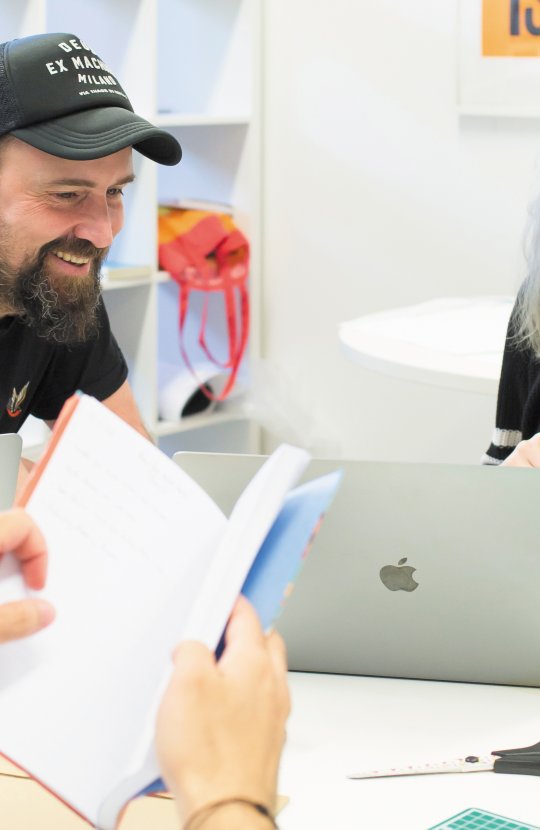
Virtual tour
Discover where you’ll spend your time as a student with our 360° tour, showcasing our facilities, accommodation, town and scenery.
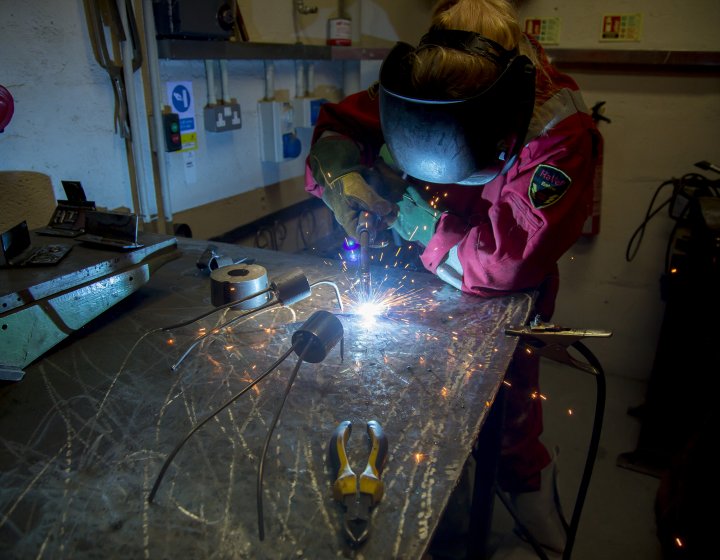
Art & Design Facilities
Primarily located at the Falmouth Campus in a subtropical garden, our studios and workshop facilitie...
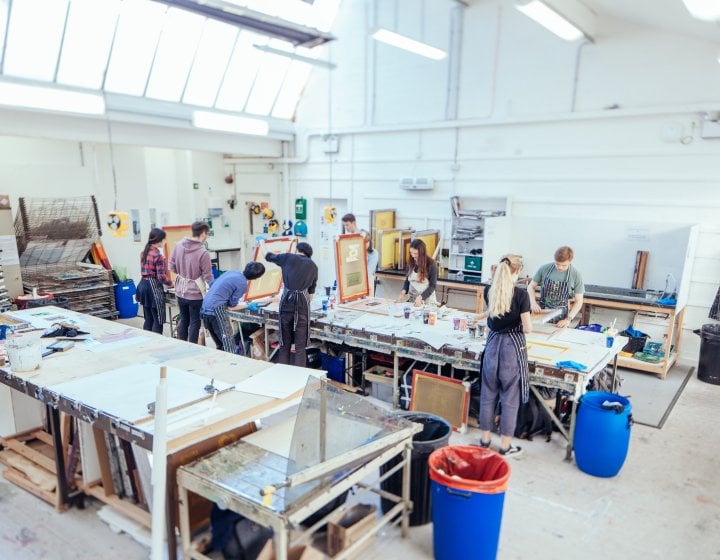
Printmaking Facilities
We facilitate a range of printmaking techniques and encourage both traditional and non-traditional p...
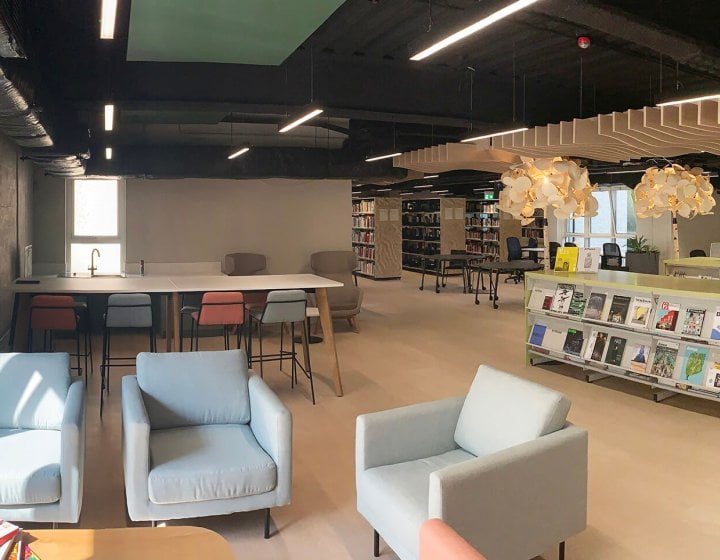
Library Facilities
Offering extensive collections, our two libraries provide a wealth of digital resources, magazines, ...

Sports Centre
Our Sports Centre, on Penryn Campus, includes a spacious gym with up to 90 of the latest, new statio...
How you'll learn & be assessed
Throughout your Graphic Design degree, your learning and teaching experience will be centred around dedicated studios. There are also shared spaces, including seminar rooms, lecture theatres and workshops, where you’ll receive inductions in the various and wide-ranging skills that a professional graphic designer is expected to use today.
Alongside being taught by full time staff who have a wide range of industry and academic experience, we also have visiting lecturers from across the UK and around the world. These provocateurs introduce a variety of professional practice insights, that will inspire you and help you prepare you for the start of your career.
In terms of your studies, we reflect an approach largely based on strong studio practice methods all designers use. This includes getting you to talk about your ideas and present to a variety of audiences and in different informal and formal situations. These can include one-to-one tutorials, seminars, lectures and supervised time in the studio.
We’ll also have specialist inductions, IT skills training and masterclasses that are typically held when we welcome visiting lecturers.
There is also an emphasis on you to manage and develop your work and time, so you gain the appropriate motivation to drive your own academic and career aspirations. You can rely on staff to direct you through regularly weekly briefing sessions and manage our digital learning space where all your learning materials and lectures will be archived each week.
100% of your assessment will be coursework.
Assessment methods:
- Opportunities for ongoing feedback & review happen weekly (normally every 2–3 days), with both staff and other students.
- The work you submit is normally ‘graphic’ (i.e. visual in nature) but also will include some written and physical elements.
- Sketchbook & development work is as valuable as the traditional ‘outcome’.
- Your work is assessed in response to a variety of design briefs & workshops.
- It is assessed against a ‘design orientated’ criteria shaped by the course team and informed by the best of industry practice.
- Formal assessment occurs after each module (normally twice yearly).
- In year three, you’ll exhibit your work for assessment as part of a final-year show.
Meet Abbie, a third-year Graphic Design student at Falmouth University with a passion for publication design.

"The studio environment is a huge part of the course and one of the reasons I picked Falmouth. You can get instant feedback not only from your peers but also from the tutors who are in the studio with you."
Matt Taylor, current student

"I’d recommend the course to anyone looking to expand their creative skills and knowledge. This degree really challenged me and pushed the boundaries of what I thought was possible in design."
Anouska Sears, graduate

"Falmouth is the best place to study Graphic Design. As someone who had not studied the subject before joining the course, it’s been the perfect place to give me a solid foundation to start a career."
Eathan Aktion, current student
This course could be for you if...
- You want to develop quality ideas that push your creative process.
- You want to investigate questions relevant to the modern world through your work.
- You like thinking critically about your work and want to contextualise it in our current culture.
- You want to learn how to tell compelling visual stories.
- You enjoy making work that’s relevant to different audiences.
- You have a passion for visually and verbally articulating ideas to others.
- You like exploring, drawing, and making ideas through a number of media types.
Studio Kiln: the Falmouth alumni with global clients
Nathan Smith and Charlie Hocking met by chance in a shared workspace and quickly realised they had a lot in common.
After graduating from Falmouth University’s Graphic Design BA(Hons) and Integrated Foundation Year courses respectively, they moved to London and worked with some of the world’s biggest brands. Now based in Penryn, these proud Cornishmen have their own global clients, including Vinted and ITV, and employ graduates from the Graphic Design course.
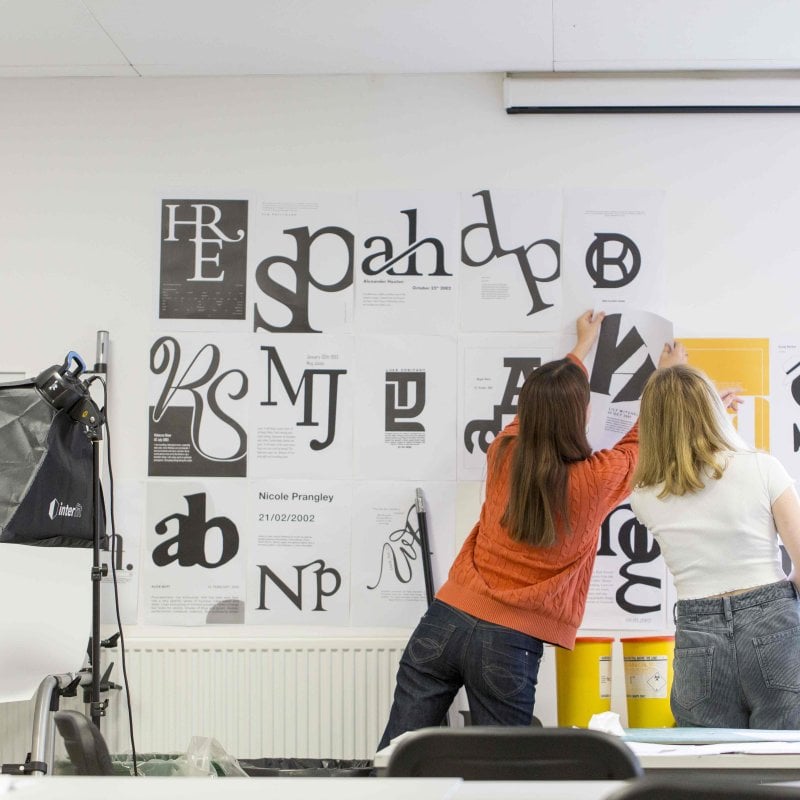
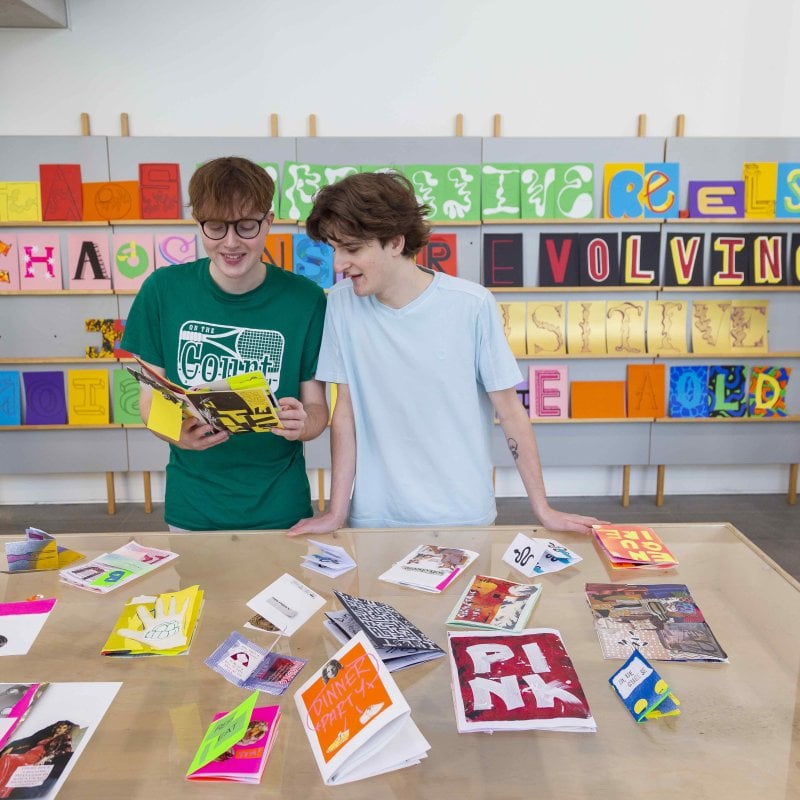
Staff
Our award-winning team all share a passion for the graphic ‘idea’ and a design ‘process’. They are engaged in commercial practice, writing books, contributing to key publications, and several are invited to judge both student & professional design awards. Their broader research draws from a wide range of themes and is centred around re-defining the discipline as a question, as much as it is an answer.
Some members of staff only teach on specific modules, and your course might not feature every staff member who teaches on the course.
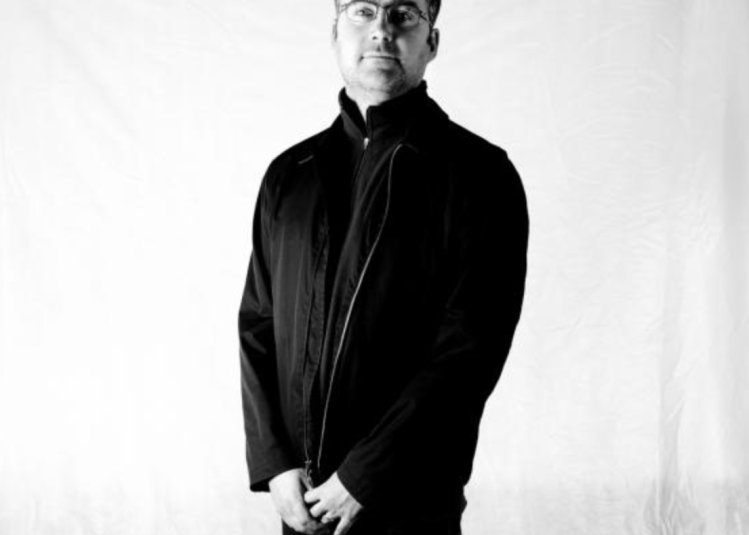
Bryan Clark
Head of Graphic Design
Bryan leads the subject of Graphic Design at Falmouth and is responsible for the undergraduate degre...
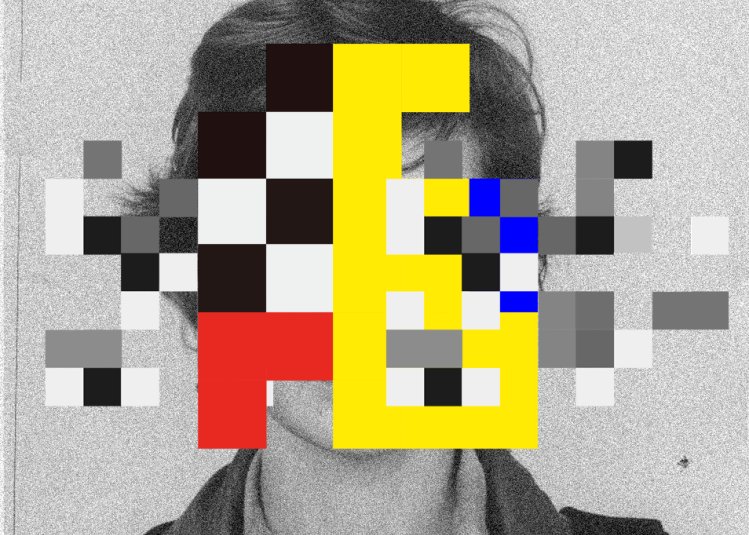
Dr Robyn Cook
Associate Professor of Design Ecologies
Dr Robyn Cook is an Associate Professor of Design Ecologies in the Department of Graphic Design at F...
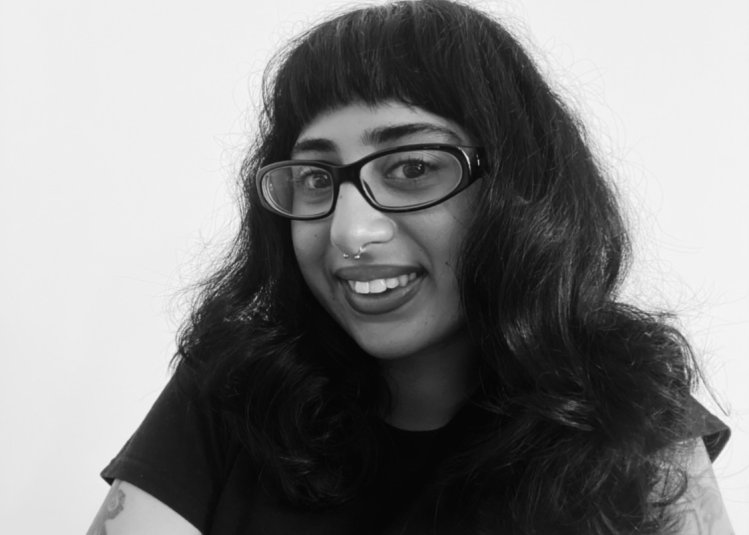
Sneha Modhvadiya
Lecturer
Sneha is a designer who specialises in typography, print, code, and curatorial design. She graduated...
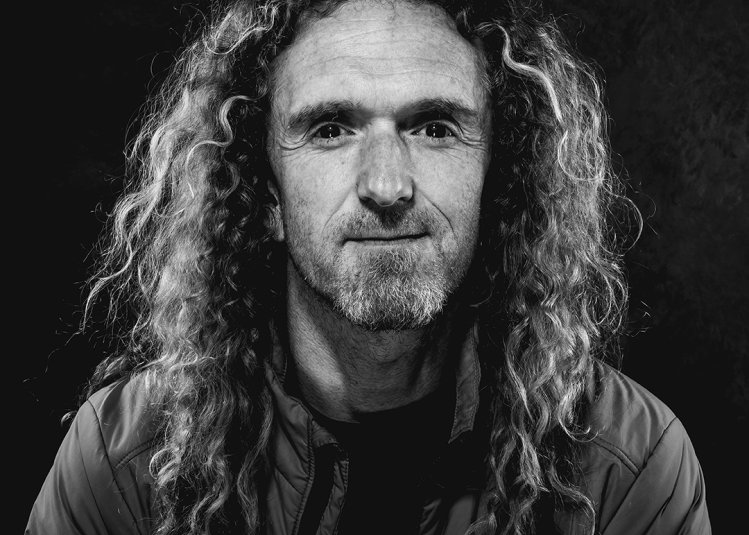
Andy Neal
Course Leader, Graphic Design BA(Hons)
Andy has been part of the Falmouth University community for over 25 years and is a firm believer in ...
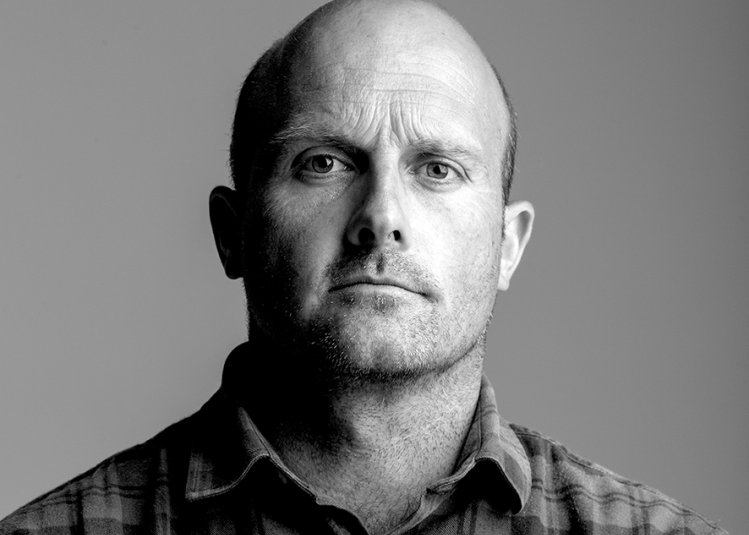
Ashley Rudolph
Senior Lecturer, Graphic Design
Ashley is a Senior Lecturer in Graphic Design within the School of Communication at Falmouth Univers...
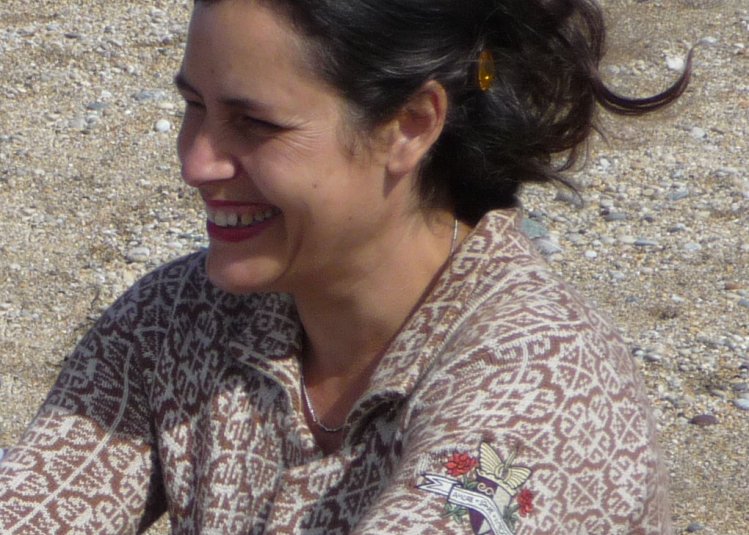
Nicola Salkeld
Senior Lecturer / Course Co-ordinator (Stage 1)
Nicola is one half of MOTH, which is a research project, that investigates the skills and contributi...
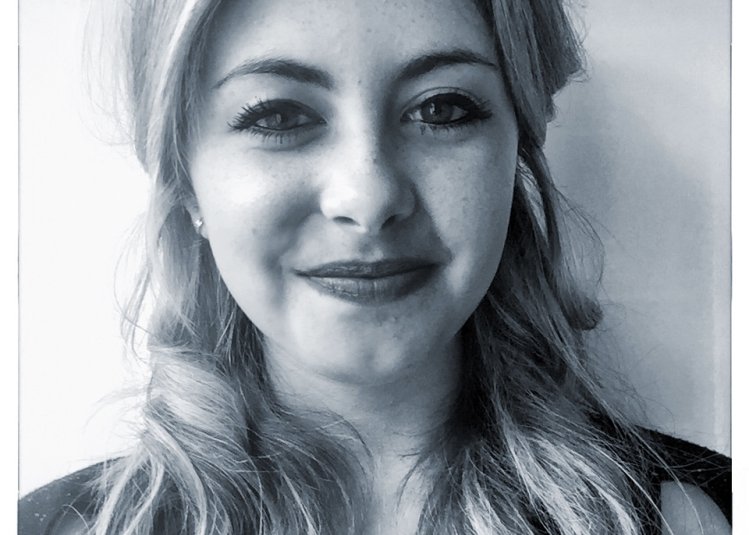
Chelsea Carter
Lecturer, Graphic Design BA(Hons)
Chelsea is a Lecturer in Graphic Design at Falmouth University within the School of Communication. C...

Steve House
Senior Lecturer
I've spent 16 years working in the creative industry and have been involved in creative education fo...
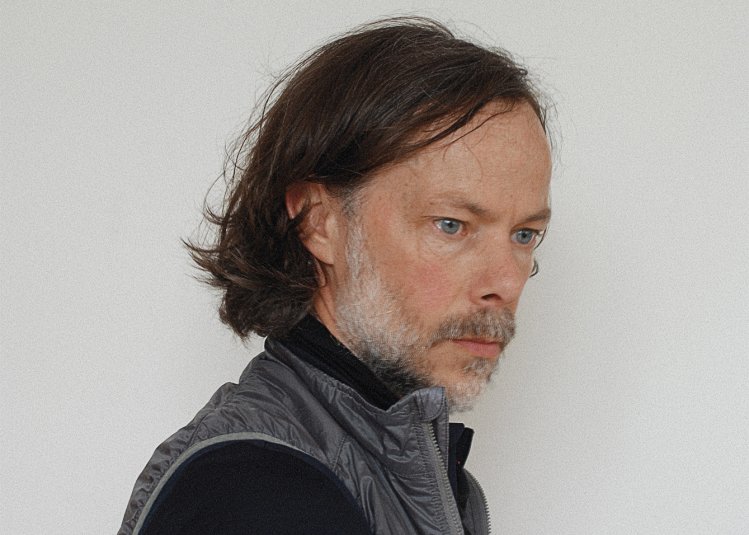
Nick Raven
Associate Lecturer
Designer and educational practitioner. Creative and critical thinker. Delivering powerful communicat...
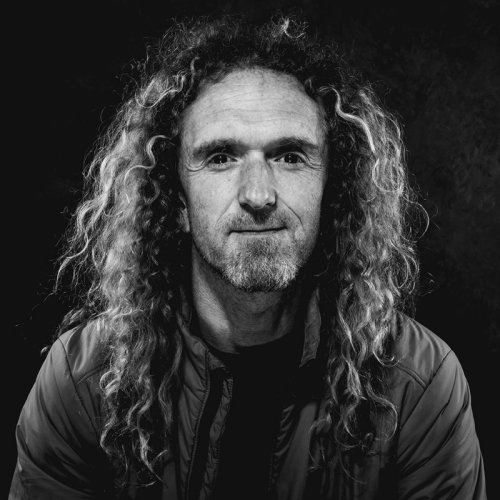
Got a question about this course?
If you want to know more about the course structure, our application requirements or what our graduates have gone on to achieve, our friendly course team is here to help.
Chat to Andy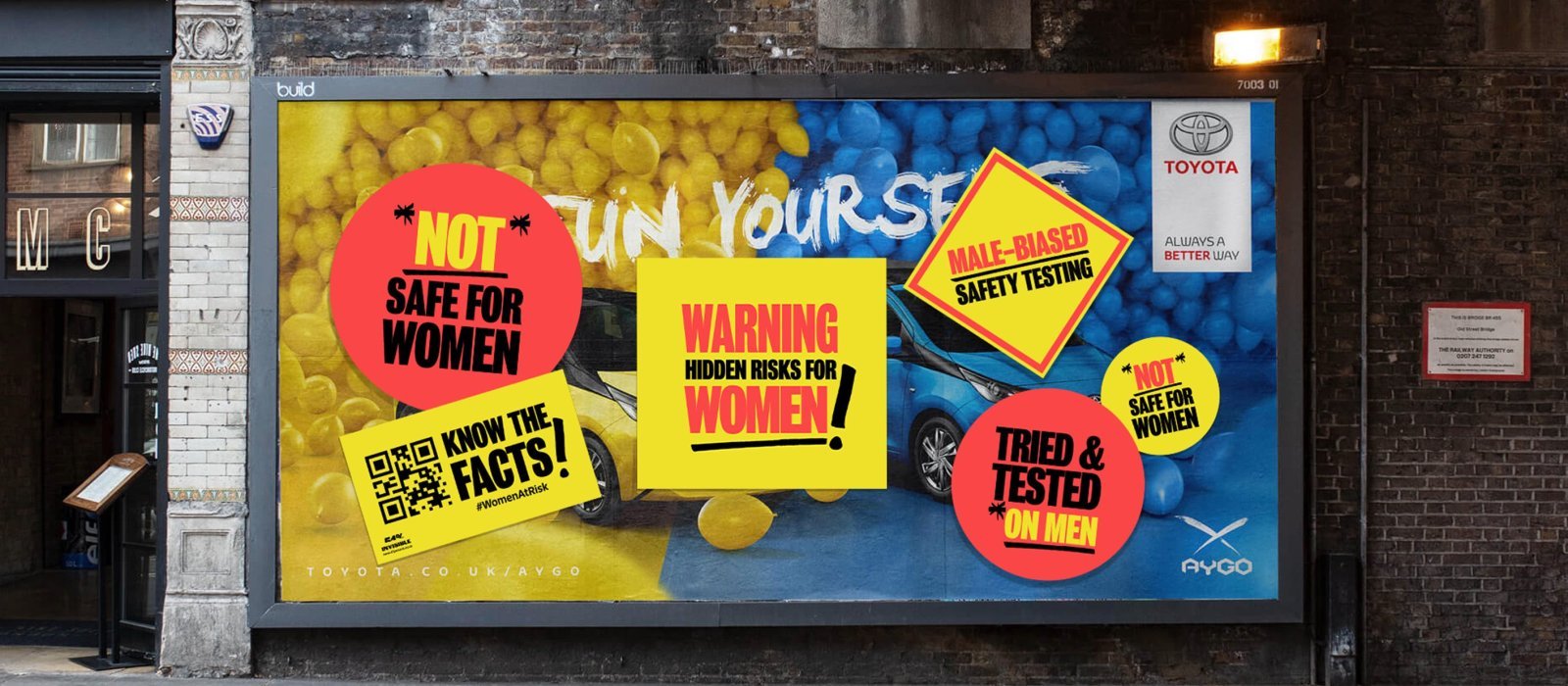
Work by Amy Whittaker
Stories from our community
Explore student projects, graduate successes, staff news and industry insights
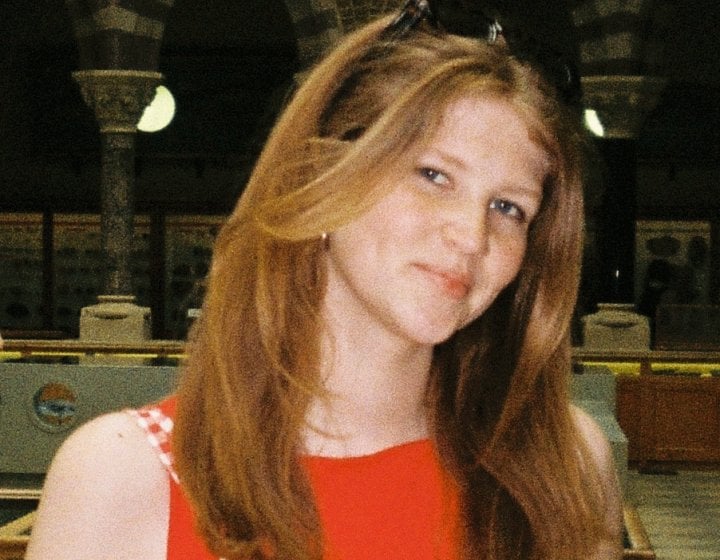
Meet the Graphic Design alumna working behind-the-scenes on The Great British Bake Off
17 October 2025
Alice Brown’s career in TV first began after one of her student projects was featured at the D&AD ...
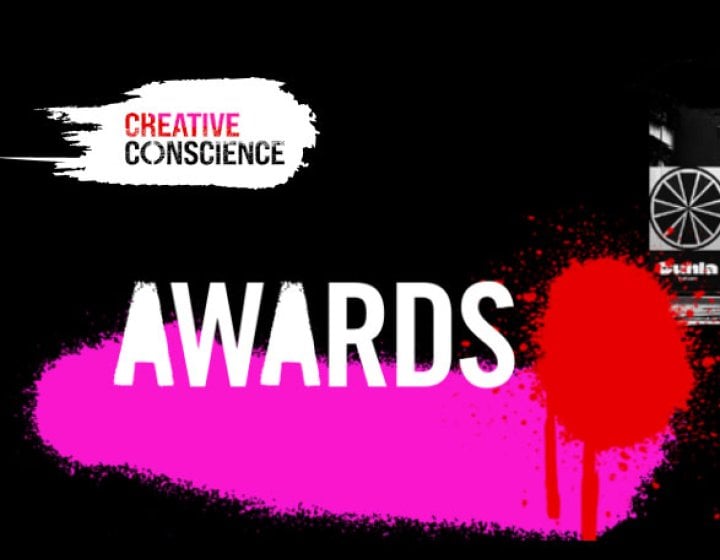
Students win big at Creative Conscience Awards 2025
07 October 2025
Eight students have been awarded the top awards at this year’s Creative Conscience Awards, with th...
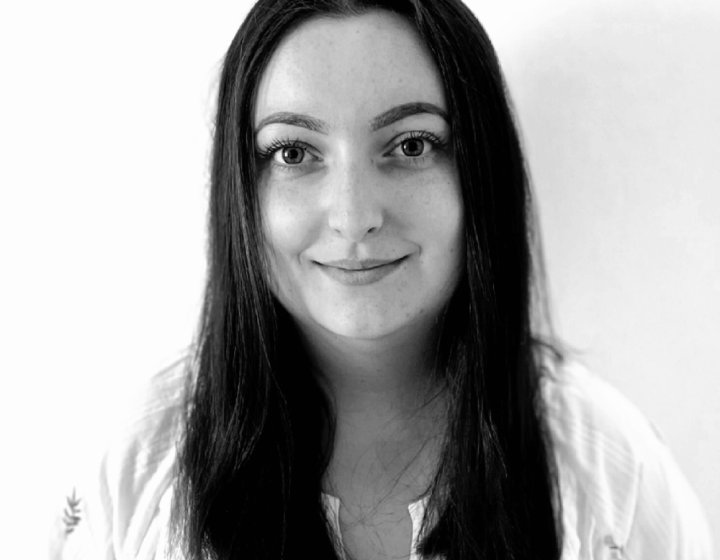
Meet the Graphic Design alumna who is designing book covers for Profile Books
23 September 2025
After completing her Graphic Design BA(Hons) in 2022, Megan Rayner is now spending her weekdays desi...
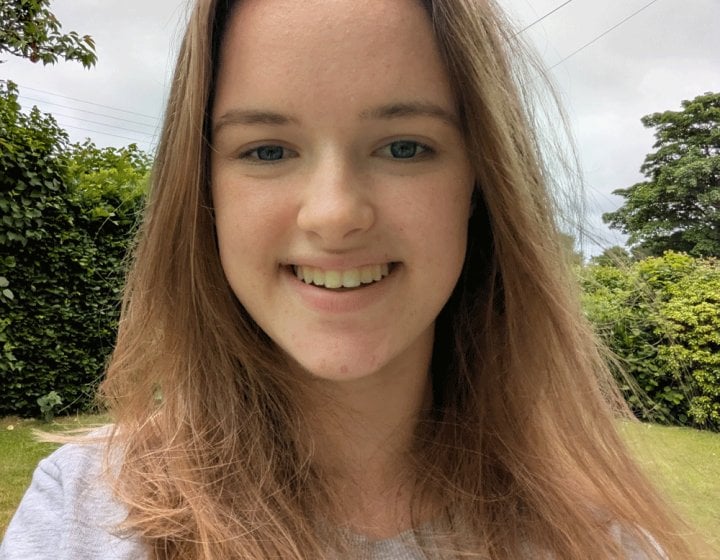
Graphic Design student puts industry-ready skills into practise on digital marketing agency placement
10 September 2025
Bethany Childs has spent the summer between her second and third year at Falmouth completing a caree...
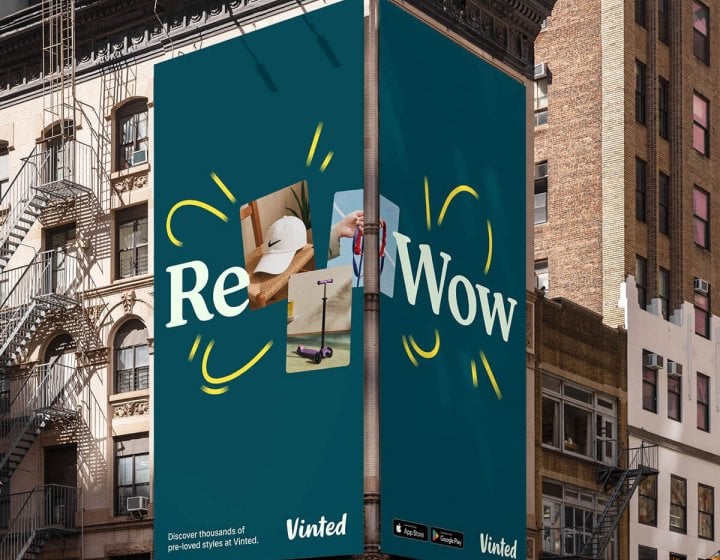
Studio Kiln: the Falmouth alumni refreshing Vinted’s global identity
20 August 2025
Nathan Smith and Charlie Hocking are the creative minds behind Studio Kiln, a design studio in Penry...
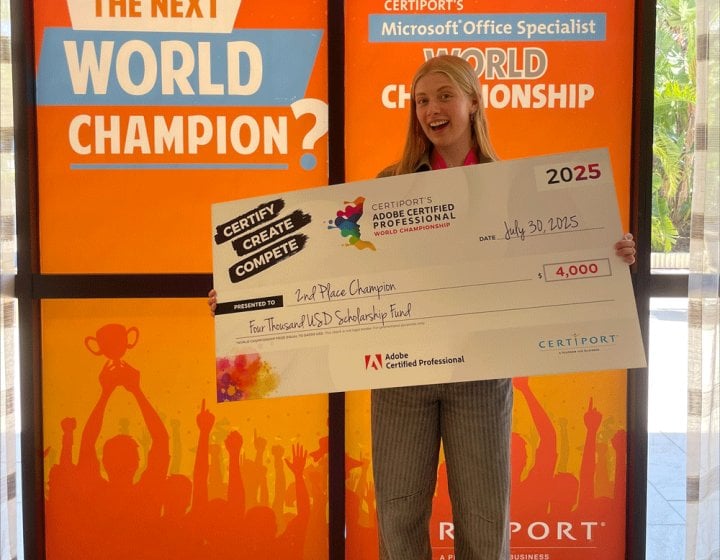
Falmouth short course student comes second in World Adobe Championship
01 August 2025
Hallie Mitchell, a student who chose to study Falmouth’s Photoshop ACP short course on top of he...
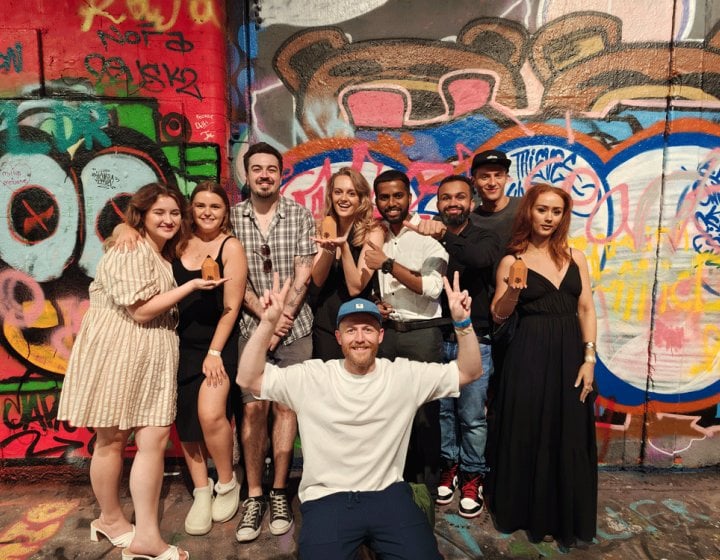
Falmouth students and alumni win four Wood Pencils at D&AD Awards 2025
16 July 2025
The prestigious D&AD Awards, held in early July, was judged by creative leaders and innovators to ce...
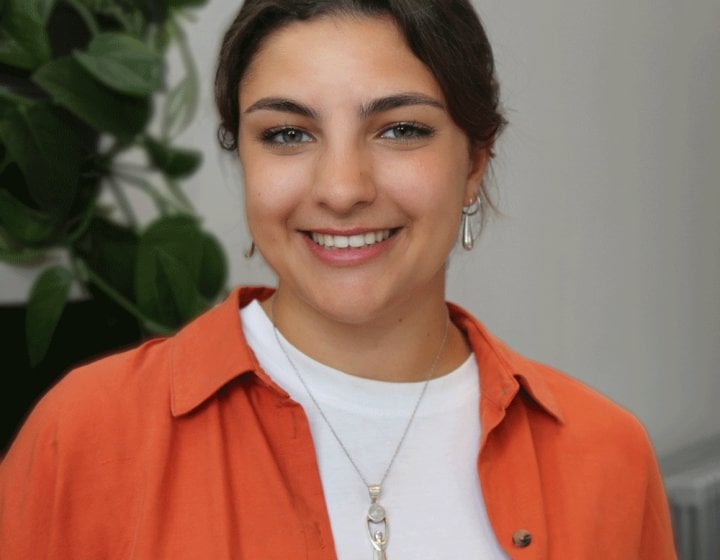
“I still can’t believe this is what I do for a living”: Falmouth graduate on designing for household brands
20 June 2025
Annabelle Johnson has gone from studying Graphic Design BA(Hons) at Falmouth to contributing to the ...
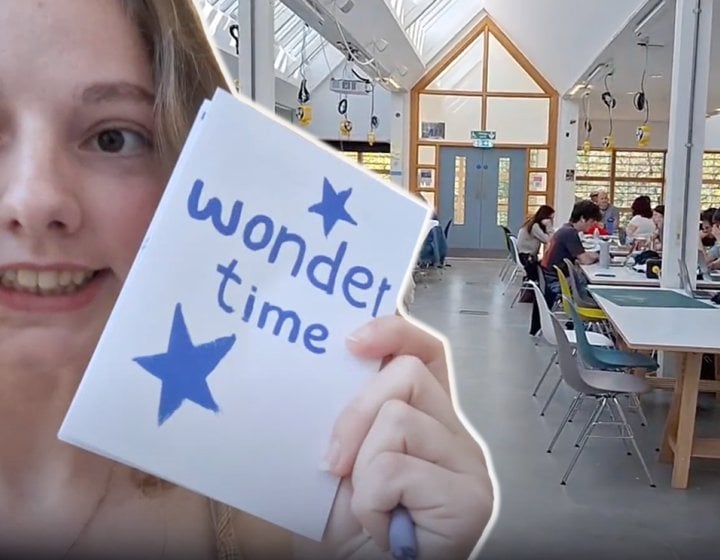
A day in the studio as a Graphic Design student
27 May 2025
Follow second-year Graphic Design student, Ella, as she spends a day in the studio.
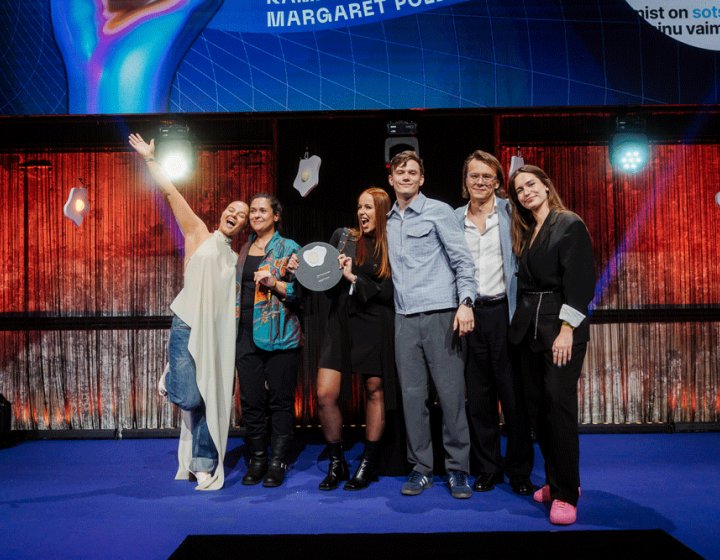
Graphic Design graduate wins gold at the Estonian Marketing Awards
15 April 2025
After being tasked with just 48 hours to create a marketing campaign that explores the harmful effec...

“Have a strong idea at the heart of every creative project,” says James Flint
25 March 2025
After graduating from the Graphic Design BA(Hons) in 2012, James Flint got a lucky break as an inter...
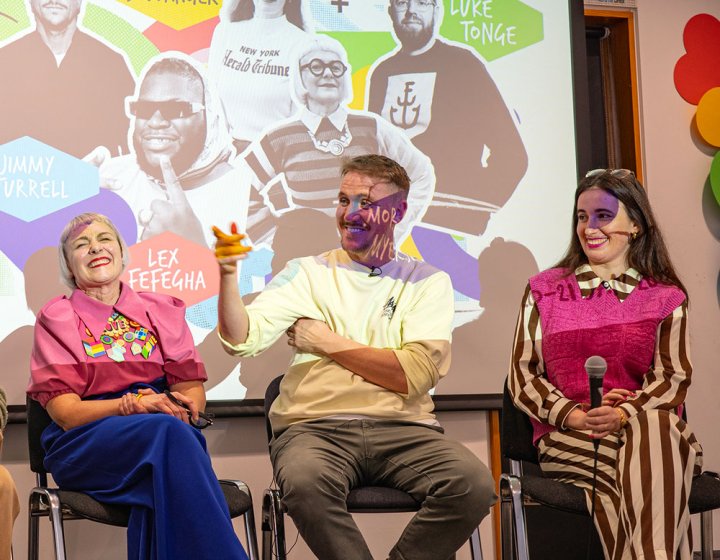
Design advice from five sector-leading creatives
13 February 2025
Students from across our Graphic Design BA(Hons) community recently had the chance to hear the uniqu...

Q&A with Graphic Designer, George Sutton
12 February 2025
George Sutton is a practicing designer - and alumni of Graphic Design BA - with an eye for cross-sec...
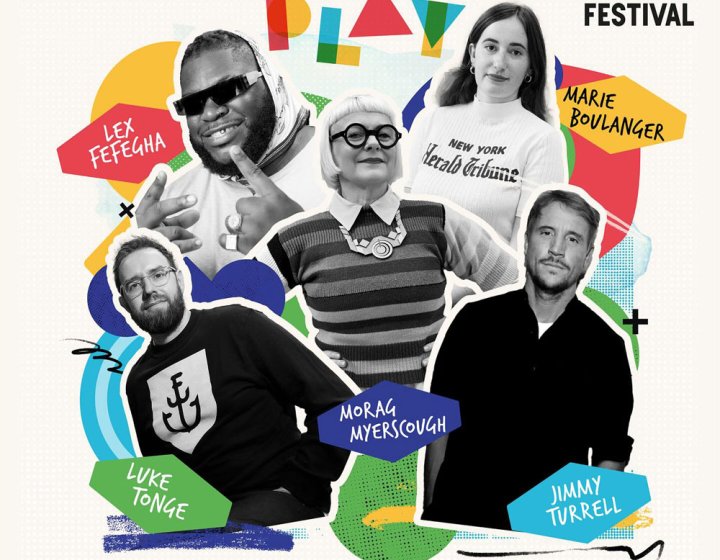
‘Design is Play’ Symposium: A Look into our Collaborative Graphic Design Event
10 February 2025
A group of innovative and engaging graphic designers came to Falmouth this January as part of an ins...
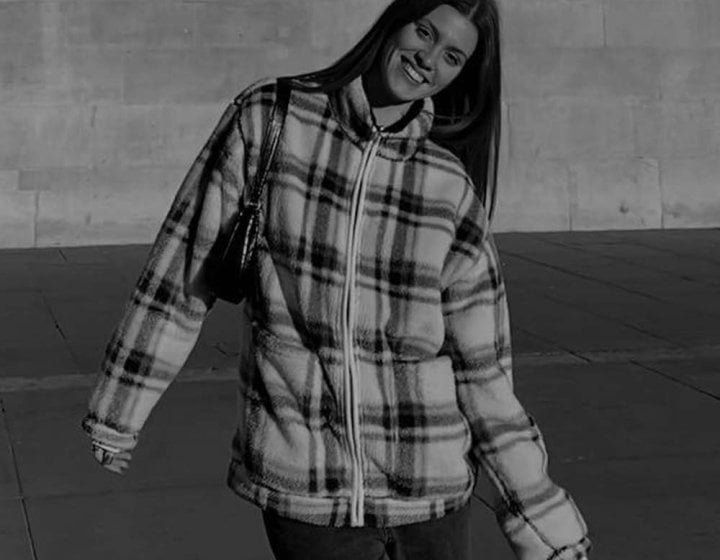
Graduate Anouska Sears: “Design truly has no limits”
06 January 2025
After working and gaining experience at various creative agencies, graduate Anouska decided to switc...

A day in the life of a Graphic Design student
10 December 2024
Follow a typical day of Graphic Design student, Matt.

Students win four Creative Conscience awards
07 October 2024
Four student projects have scooped award wins in this year's Creative Conscience awards
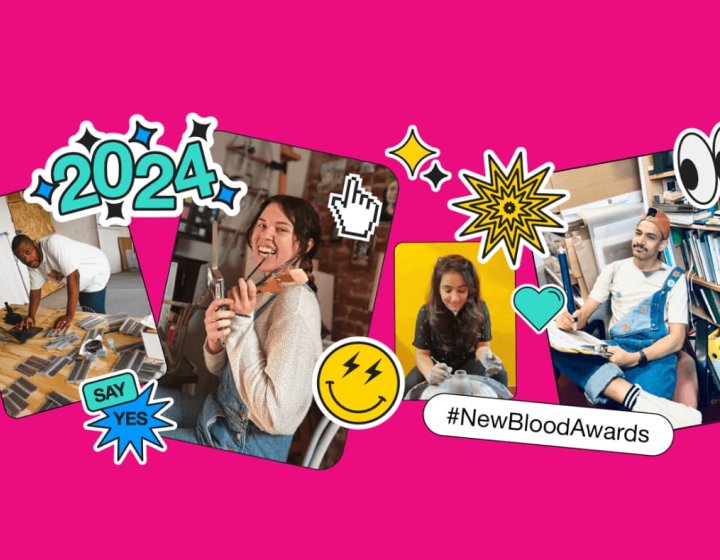
Students scoop six Pencils at D&AD Awards 2024
05 July 2024
Six student projects have scooped Pencils in this year’s D&AD New Blood Awards
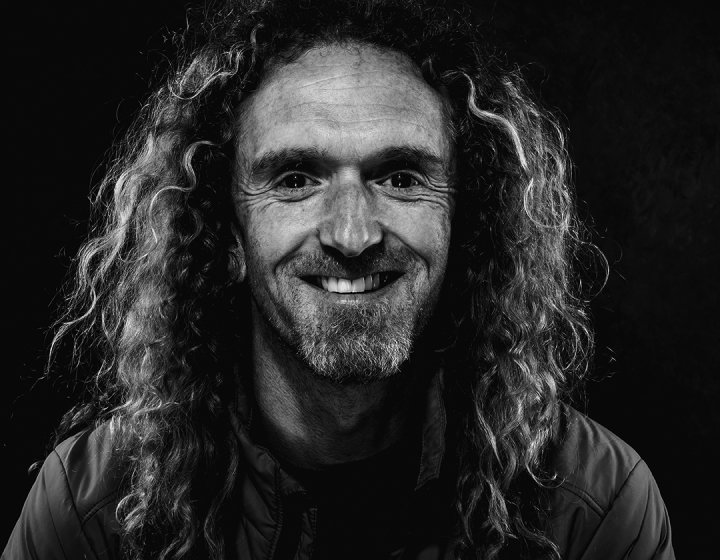
Introducing Andy Neal: New Course Leader for BA(Hons) Graphic Design
21 May 2024
We are delighted to announce that Andy Neal will be moving into the role of Course Leader for our es...
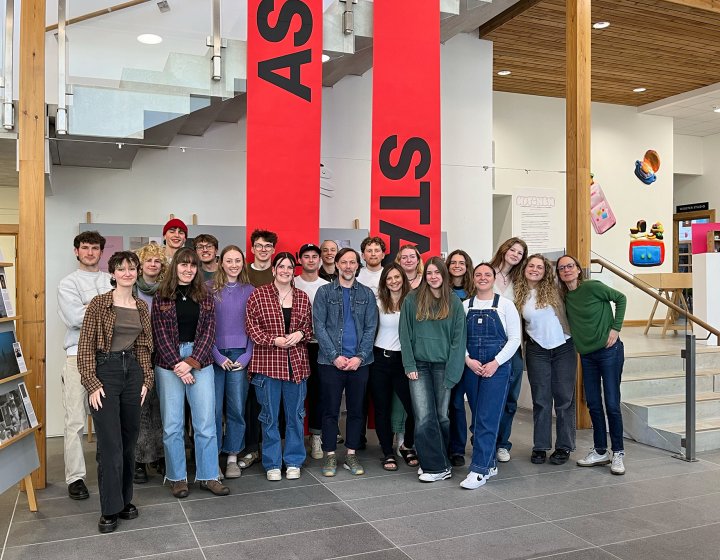
Embracing your biggest fear, with award-winning designer Astrid Stavro
21 May 2024
We were thrilled to welcome the award-winning, internationally renowned, London-based designer Astri...
Careers
Our graphic design graduates are working as:
- Junior Designers working in editorial & publishing, branding & packaging, ethical & digital innovation, in some of the world’s leading agencies, including; AKQA, Superunion, Apple, Design Bridge, SomeOne, Made Thought, Jack Renwick Studio, Prophet and Mother.
- Freelance Designers working across a broad range of generalised and specialised subject disciplines, including; Graphic Design, UX/UI Designers, Design Strategists, Content Developers, Artworkers and Motion Designers in both the UK and abroad.
- Broader subject-specialists, including; Design Writers, Illustrators, Photographers, Film-makers and Archivists. Several continue each year to pursue post-graduate study or take the first steps toward working within education (Primary through to Higher).
- Many students have gone on to establish their own studios. Recent national successes include; Rockabye, Wolfe Hall, Thoughtful Standard, and Studio Kiln. Some also decide to work within very niche areas (design-for-film), in politics (as campaign leads) or for NGOs (inc. British Red Cross). We even have a Rock Star.
What can you do with a graphic design degree?
A degree in graphic design offers multiple industries to work in. From designing for digital platforms to engaging in social impact work, our course helps you explore your unique voice and equips you with versatile skills to succeed in roles you may not have even considered.
Explore graphic design careers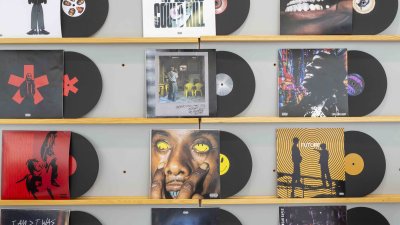
How to apply
Ready to apply for 2026?
You can apply for our undergraduate degrees via UCAS. You'll need our university UCAS code (F33) as well as your course code (which you'll find on your course page) for your application.
Applying as an international student?
There are a number of different ways to apply to study at Falmouth as an international student. Find out how you can become part of our creative community.
| Course route | UCAS code |
|---|---|
| Graphic Design BA(Hons) three year degree | W214 |
| Graphic Design BA(Hons) with Integrated Foundation Year | FY08 |
| Graphic Design BA(Hons) with professional placement | PY48 |
For starting your studies in 2026
UK applications: 14 January 2026 (for equal consideration)
Applications after the 14 January will be considered on a first-come, first-served as long as there are places available. Apply for this course now.
For starting your studies in 2027
UK applications: 13 January 2027 (for equal consideration)
International fee payers
International fee payers can apply throughout the year. But we recommend applying as early as possible, to make time for visa and travel arrangements.
We consider all applications on their own individual merit and potential.
Our diverse community is creative, innovative and entrepreneurial. We recognise that these qualities aren’t always shown in academic grades alone. That’s why, while many of our applicants achieve high academic grades, we also welcome those who can demonstrate their potential through an exceptional portfolio or performance.
We welcome applications from all subject backgrounds, whether you’ve specialised in STEM, the arts or humanities. Find out more about our Entry Requirements here.
Course routes & entry requirements
BA/BSc(Hons) three year degree: minimum 64 UCAS Tariff points
BA/BSc(Hons) four year degree with professional placement: minimum 64 UCAS Tariff points
BA/BSc(Hons) four year degree with Integrated Foundation Year: minimum 32 UCAS Tariff points
At Falmouth, we'll consider the equivalency of your specific qualifications against our entry requirements and support you through your application journey.
View our International Entry Requirements
Language requirements
For applicants whose first language is English we require you to have or be working towards GCSE English Language Grade 4 (C), or equivalent.
If English is not your first language you will need to meet the same standard which is equivalent to the IELTS Academic 6.0 overall score, with at least 5.5 in Reading, Writing, Speaking and Listening. We accept a range of in country equivalencies and approved tests.
If you need a student visa to study in the UK, you may need to take a recognised language test. You can read our English Language Requirements for more information.
Fees, costs & funding
Tuition fees
| Annual tuition fee | Student |
|---|---|
| £9,790 per year | Full-time UK |
| £19,950 per year | Full-time EU/international |
| £1,955 per professional placement year | Full-time UK and EU/international |
| £9,790 per Integrated Foundation Year | Full-time UK |
| £19,950 per Integrated Foundation Year | Full-time EU/international |
| Annual tuition fee | Student |
|---|---|
| £9,535 per year | Full-time UK |
| £17,950 per year | Full-time EU/international |
| £1,905 per professional placement year | Full-time UK and EU/international |
| £9,535 per Integrated Foundation Year | Full-time UK |
| £17,950 per Integrated Foundation Year | Full-time EU/international |
Tuition fees for September 2027 will be confirmed in summer 2026.
Tuition fees are set annually and are subject to review each year. The University may therefore raise tuition fees in the second or subsequent years of a course, in line with inflation and/or the maximum permitted by law or Government policy. Students will be notified of any changes as soon as possible.
The figures above don't include accommodation and living costs
Typical course costs
Recurring annual costs
£100 per year for basic studio materials (such as: academic diary, sketchbook, metal ruler, scalpels, pens, pencils, USB stick, masking tape, glue, eraser etc.)
Recurring printing costs
£100–£300 per year
One-off costs for the duration of the course
A personal laptop, approx. £350 - £1,800 - this cost is variable, as these can be purchased second hand. You can also use the University's IT suites if you do not wish to purchase a personal laptop.
Adobe Creative Cloud
You will need access to Adobe Creative Cloud. You may be eligible for discounted licenses through Adobe's education pricing and Falmouth University seeks to provide further discounts when possible. If any discounts are available, we will communicate these to you.
For more information please visit Adobe Creative Cloud.
Optional study trips
Approx £100-£1000 (depending on location), and approx. £15 for local day trips to St Ives.
Course equipment and costs
As a discipline, graphic design is essentially about ideas, and our need for equipment is considerably less than many other creative practices. That said, there are some ongoing costs each year and (if you so choose) some longer term investments as follows.
Studio kit (regular cost);
You should allow at least £100 for the basic studio kit needed across each year (outlined below). Everything is available from the University shop when you arrive, but there a few things (*) worth getting before-hand as you will need them in the first week;
- Academic year diary (essential, although you may prefer a digital, online version) *.
- A3 layout pads or sketchbooks (you will get through these!) *.
- Selection of pencils (in several different weights) *.
- Pritt Stick *.
- Masking tape.
- 12-inch metal ruler.
- A dozen-or-so packs of Sticky Notes (the cheapest you can find).
- Scalpel and blades such as Swan Morten (10a blades most useful).
- Retractable pencil (basic).
- Plastic eraser.
- Memory stick (USB).
- A selection of coloured pencils or markers.
You will be taking part in a bookbinding workshop in your first year. We recommend that you purchase a good basic kit which can be picked up online for about £10–20, although this is optional as we will supply the basic materials you need.
–
Printing (regular cost);
You will also need to allow for ongoing weekly/monthly printing costs for projects and any experimentation undertaken, which can be anything between £120 and £350+ depending on your needs each year (especially in the final year). Printing is one of our most regular costs as designers, and basic A4/A3 black & white (5p/9p) or colour printing (18p/35p) is charged to your account as you use it. There are also modest ‘screen’ charges for screen-printing and ‘masters’ charges for riso-printing, but this should be included in the above (unless you focus heavily on the resources).
–
Reading material;
We know that reading is not everyone’s favourite past-time (especially in our tech-heavy, image-led world). However, reading (and thinking about a text) will be a central part of your journey with us. All of the materials you will need on the course are either in our Libraries or online, so any purchases are entirely optional.
That said, we would encourage you to buy the following book before you arrive, as it covers many of the themes we will be considering on the course. Try to dip in and out of it over the summer (and beyond), and we will focus on it more directly during the second year of the course.
Title; MC24 (24 Principles for Designing Massive Change in your Life and Work).
Author; Bruce Mau.
Publisher; Phaidon Press (2020).
Cost; Around £35.00 (although you may find it cheaper online or used).
–
Laptops & Computers (optional one-off cost);
A computer is an essential piece of equipment as a Graphic Designer (although, remember it is just a tool). That said, several of our students complete the degree each year just using our university machines – and many will wait until the second year before buying one. If you do choose to invest, you will need either an Apple Mac or Windows machine, capable of running the Adobe Creative Suite. Beyond the course itself, this is likely to be one of the biggest investments you make whilst studying design and could cost between £350 and £1800.
The Adobe Creative Suite is available for you as a student at Falmouth at a heavily discounted rate (around £68 per year) if you do have your own machine, although the software is on all the University machines – including the ones in our studios. The system requirements to run the software can be found here and you will be able to purchase it once you have enroled:
helpx.adobe.com/uk/creative-suite/kb/cs6-system-requirements.html
You will also need a reliable broadband connection (if you are living in University accommodation you will have this already) for any remote work you may do.
–
Study trips (optional);
In the first study block of the first year, we run a short day-trip to St Ives. This is heavily subsidised by the course, but we ask that all students contribute a nominal £15 towards the travel costs. We will collect payment for this in the first week of term and please do let us know if this is likely to be a problem.
In the second Study Block of the second year (after Christmas) we normally run an cultural study trip to visit professional design studios and agencies (often in London), as well as key exhibitions. The trip lasts approximately four days although some students spend longer to visit further galleries and see exhibitions, etc. The trip is not mandatory, although it is a fantastic opportunity to visit some of the finest studios in the industry and put your own emerging design work into a professional context.
Travel and accommodation costs associated with this are arranged by the students going each year (so you can stay with family, friends, share/arrange your own room, etc.) and you should allow between £250–£400 for this. We also include final year students on the trip (so you could go in either year, or twice if you were keen – although this is less common), which allows you to save for the trip if required.
–
Exhibitions & events (optional);
We regularly encourage students to attend events, exhibitions or conferences that take place both in and outside of Cornwall. These events do not form a core requirement of the course and whilst you can visit regional exhibitions for little expenditure, anything national or European can cost much more. This can include key industry events over the summer of the second year, and more specifically in the final year.
In the final year we sometimes run other network or portfolio events where we arrange the event itself, but students are required to arrange travel/accommodation as necessary. Costs here will vary, depending on need.
–
Cameras;
If you already own a 35mm SLR or digital camera, you may find it useful to bring it with you. However, Falmouth has a wide range of photographic equipment which can be booked free of charge from our stores, so there is no need to buy anything new. Most students use their phones for day-to-day recording of material, ideas & inspiration.
- £250 for materials
- A laptop/desktop computer
- Adobe Creative Suite
To engage in the digital learning activity, although you will be able to access IT suites on campus, you will benefit from a laptop to access the platforms and tools we use. Depending on your subject, you may need a specific type of computer. If you're unsure about what you might need, please contact our course advisors.
Course equipment and costs
Typical course material costs:
£250 - Recurring annual costs may include: art/creative materials and costs towards your end of year show exhibition and can vary depending on material choices and specialism. It is strongly advised that you have a personal laptop, and preferable for you to have access to the Adobe Creative Suite which includes Photoshop, Illustrator and InDesign software (the monthly student subscription price is heavily discounted).
Study trips:
There are several IFY field trips, and you will need to allow for some costs for student contributions towards coach hire and exhibition entry. Total annual cost of day trips approximately £60.
If you want to attend the planned IFY week-long residential trip to London in the Spring of 2026 then you will need to plan for a £100 deposit payment shortly after arriving on the course, to secure a place, and to budget for a total trip cost of approx. £400 - to be paid in instalments.
Funding
For information about funding available, please visit our student funding pages.
Ask a student
What better way to find out about life at Falmouth University than by asking our current students?
From course details and academic support, to the social scene and settling in, our students are ready and available to answer any questions you might have. Simply set up your account, send them a question and they'll get back to you within 24 hours.
Similar courses
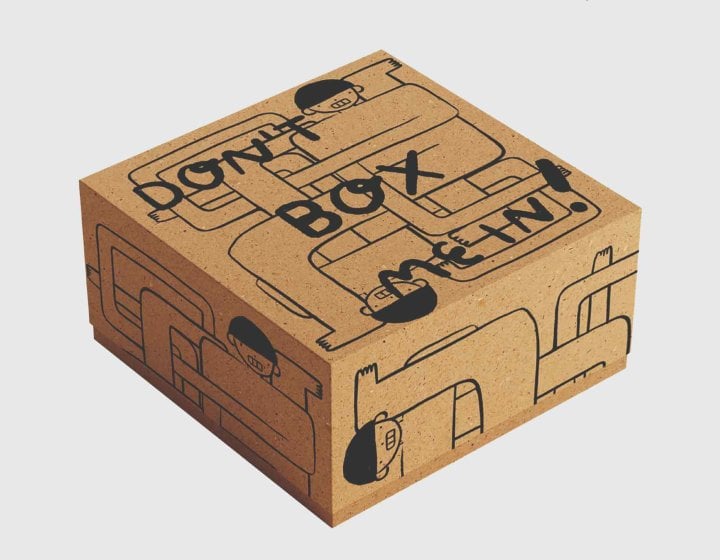
Visual Communication BA(Hons) (Online)
Get ahead in the vibrant, ever-evolving field of visual communications with this exciting online cou...
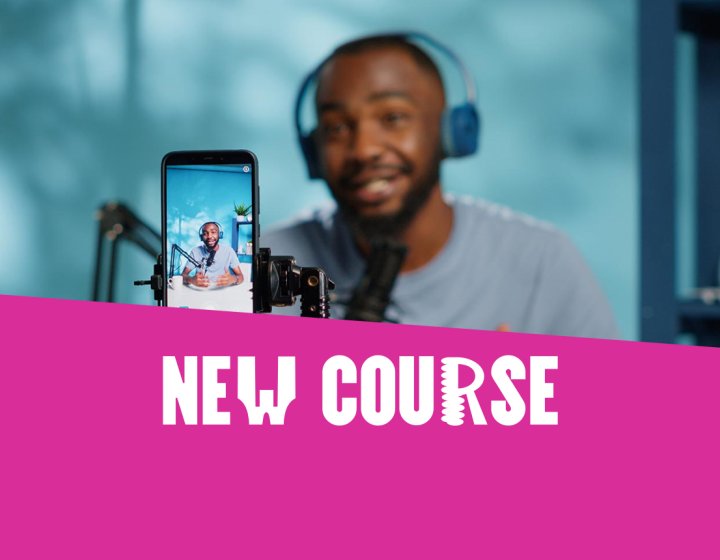
Content Creation BA(Hons)
Develop your creative, technical and analytical skills, so you can produce compelling content that c...
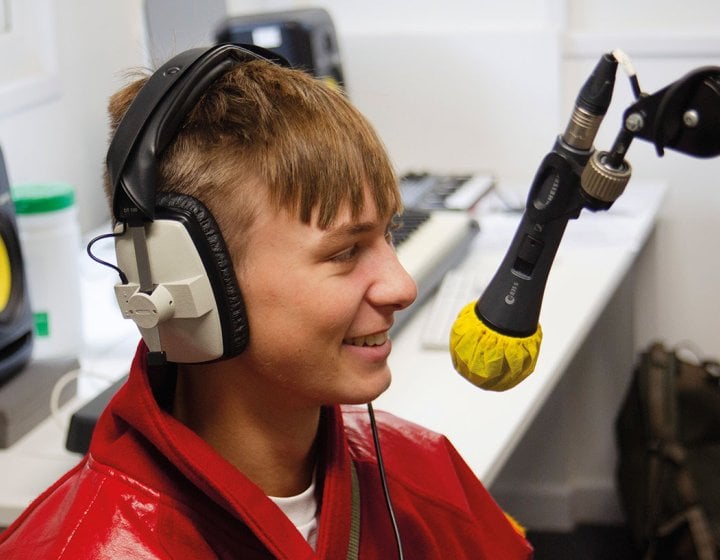
Media Production BA(Hons)
An exciting and market-driven fusion of filmmaking, advertising and journalism, this Media Productio...
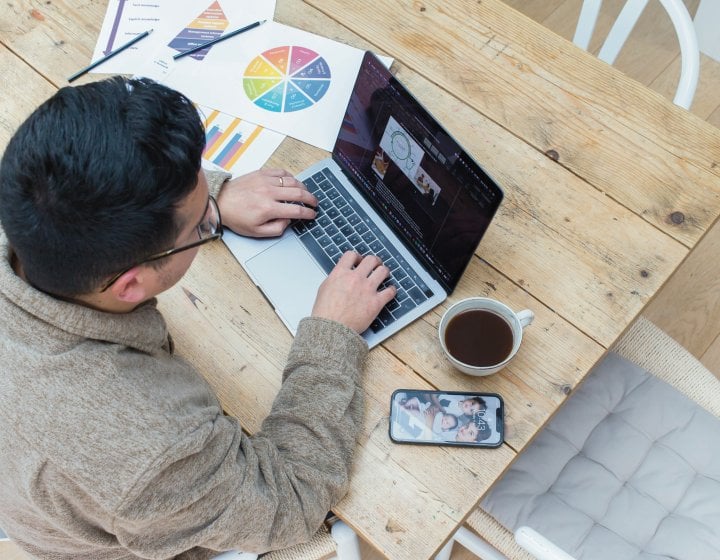
Business & Marketing BSc(Hons) (Online)
Become a skilled, confident, ethical and future-ready business and marketing professional with this ...
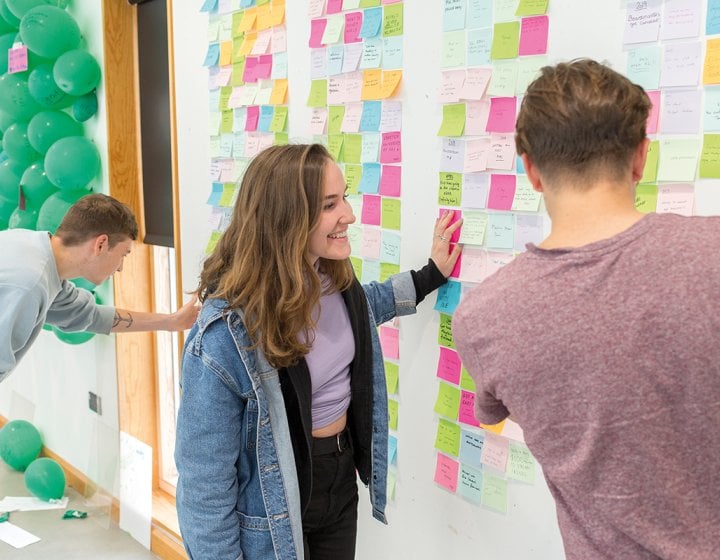
Marketing Communications BA(Hons)
Drive your ideas forward and engage with creative marketing practice on this Chartered Institute of ...

Work by Hannah Mittelstaedt
Commercial Photography BA(Hons)
From creating photographs and films for high-end advertising and marketing campaigns to producing vi...
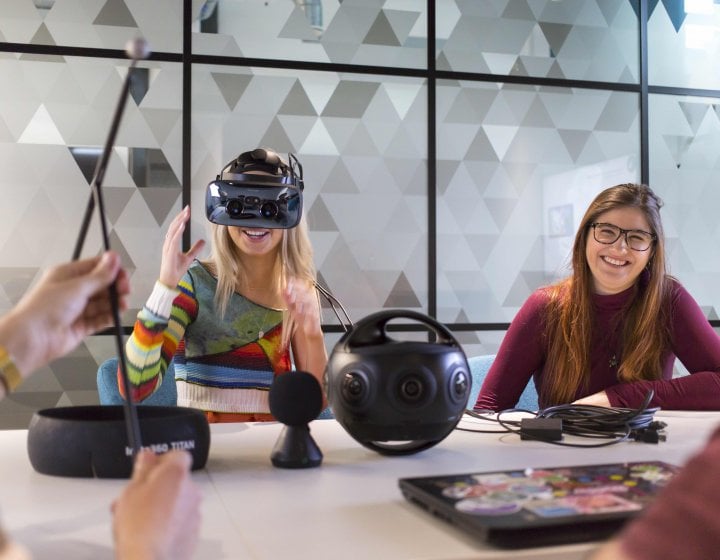
Business & Digital Marketing BSc(Hons)
Prepare yourself for a career in the fast-paced and ever-evolving world of business and digital mark...
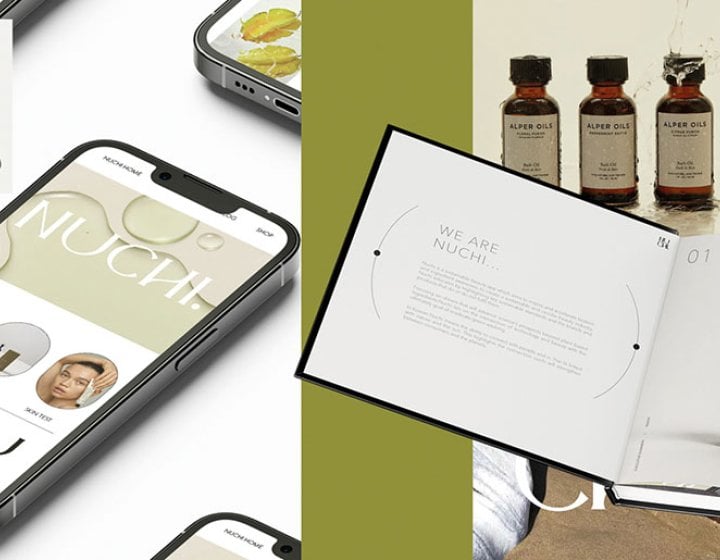
Fashion Marketing BA(Hons)
Blend your flair for communication and eye for fashion into a successful career as a fashion markete...
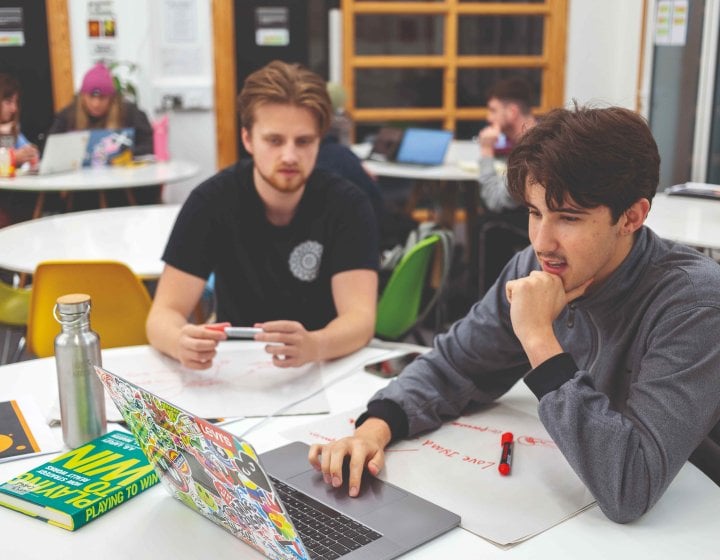
Creative Advertising BA(Hons)
Turn your ideas into powerful advertising campaigns with impact.
Open Days and events
From visiting campus to online application advice, get all the information you need about joining our creative community.
Find an event
